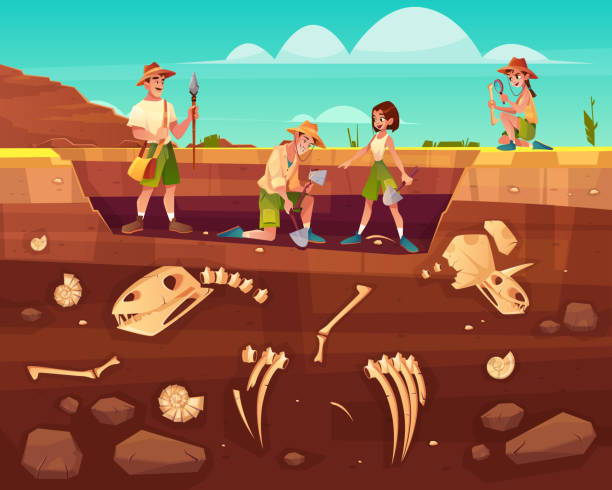May: Hi, Thomas. Did you have a good time in Turkey?
Thomas: Hi, May. I had a great time. But I have to say, although I've always been keen on being an archaeologist, before I went on an excavation, 1I used to find some of the things we did in class totally mystifying.
May: Me too. Before I did my trip to Egypt, 1I was often irritated at not being able to picture exactly what the lecturers meant. They were always so excited about everything.
Thomas: Yeah. We did a lot of practical stuff on the excavation, which I really needed. Was it harder than you expected?
May: Yes, mostly. I learned a lot more about the rules of archaeology. 2I was really taken aback by how precise you have to be with your data collection and recording. I took loads of photographs and they proved very useful, and the drawing went well too.
Thomas: Yes. I think I'm quite good with the camera. I minded about the recording though. I had no idea it would take so much time. Did you find anything particularly interesting when you were digging?
May: I did, actually. I had to dig a trench in part of the site. 3Interestingly, there weren't any bits of pottery there like you would expect to find, but I did get out some pieces of cloth and what looked like one or two silver beads. But our team leader said that they weren't. They were probably lead weights for weaving. What about you?
Thomas: I didn't find anything myself, but quite a few of the other students did. What I enjoyed was trying to identify what crops the people who had once lived in the area had grown. 4They seem to have had a much better diet than I expected. Fish and wheat, as well as oats, honey, and fruit. Lots of different things.
May: Yes. It's amazing, isn't it? And from measuring the bones in one of the sites, we found that the people were actually taller and had better teeth than the people who live in the area today.
Thomas: Probably due to less carbohydrates. How were the people you had to work with? My team was great. They were made up of people my age from all over the world. It was good to work with them. Lots of fun, and they taught me a lot. 5It was tough for us all though getting up at dawn every day and being out until late afternoon.
May: 5Oh, that's true enough. We were all exhausted, and I'd like to have an international team next time. Mine was mainly made up of English and Americans. I enjoyed the field school, but everyone was much more experienced and older than I was. It was a bit scary.
Thomas: You know there's gonna be a question about the excavation projects in our test next week. Should we just run through it for practice?
May: Good idea. Our team leader was very strict about following the right procedure. He used to say, "Never excavate anything if you're not sure it's worth excavating". Now, I think that when you've decided where to excavate, 6you go to the site hut and get whatever tools you need, then clean the area so you know exactly how big it's going to be.
Thomas: Right.
May: Okay. And you need to make sure you can remember what the site looks like before you begin digging.
Thomas: I think photos are probably best for that rather than drawings at this stage.
May: I agree. 7You then attach them to a record sheet which you get from the team leader remembering to put in the site code, unit number, and time. So much red tape. You seem to spend half the time marking rather than digging.
Thomas: That's true. 8I think you then have to draw up a detailed plan of where you're digging and then measure the limits.
May: And this is all before you actually start digging. Okay. So far, so good. Now you can start with the trowel. 9But first, you have to get soil samples, and you keep them for further analysis. Anything that you don't think is useful, you leave in place on the site.
Thomas: Yes. And if you make any finds, that is any object you retrieve, including animal bone, stone, as well as artifacts, 10they should all be registered and labeled.
May: And then you put them in a plastic bag and return them to the site hut.
Thomas: That's right. And remember to leave the tools and site hut as you would expect to find them.
May: Looks like we've learned something after all.

![[Forecast Q2-2025] - Biology lecture](https://static.helik.app/reading/8fd3d7d2-ccf9-47a3-8920-2e7a3b0d6607)
![[Forecast Q2-2025] - Living in the City](https://static.helik.app/reading/1a60bcf3-f3a7-4e9b-97a2-94d156a0de3b)
![[Forecast Q2-2025] - Student Union](https://static.helik.app/reading/fb443123-8c1d-447e-8c79-5a01650f4754)
![[Forecast Q2-2025] - Fruit-picking Job in an Orchard](https://static.helik.app/reading/e1968346-6c55-44ae-b8d3-f6a4fb7207b9)
![[Forecast Q2-2025] - University Crime Prevention](https://static.helik.app/reading/bdda593e-16d6-4c72-8a12-b116e917b27c)
![[Forecast Q2-2025] - Business Course](https://static.helik.app/reading/3308e282-99a6-4bcb-9d22-0b488701d968)
![[C20T1] - Choosing a restaurant](https://static.helik.app/reading/e9b21123-c43c-42fb-88b7-5d0be3a37e03)
![[YouPass Collect] - Car Club Scheme](https://static.helik.app/reading/6a749ba0-4cde-47fe-8260-f65b0599c3bf)